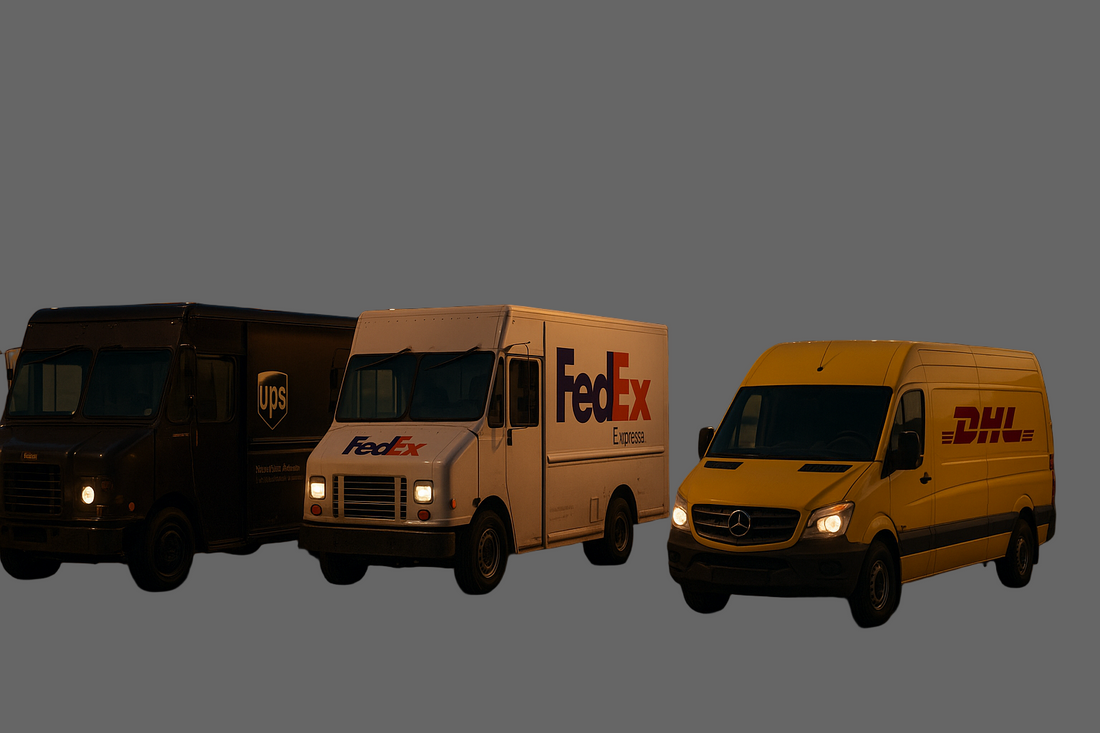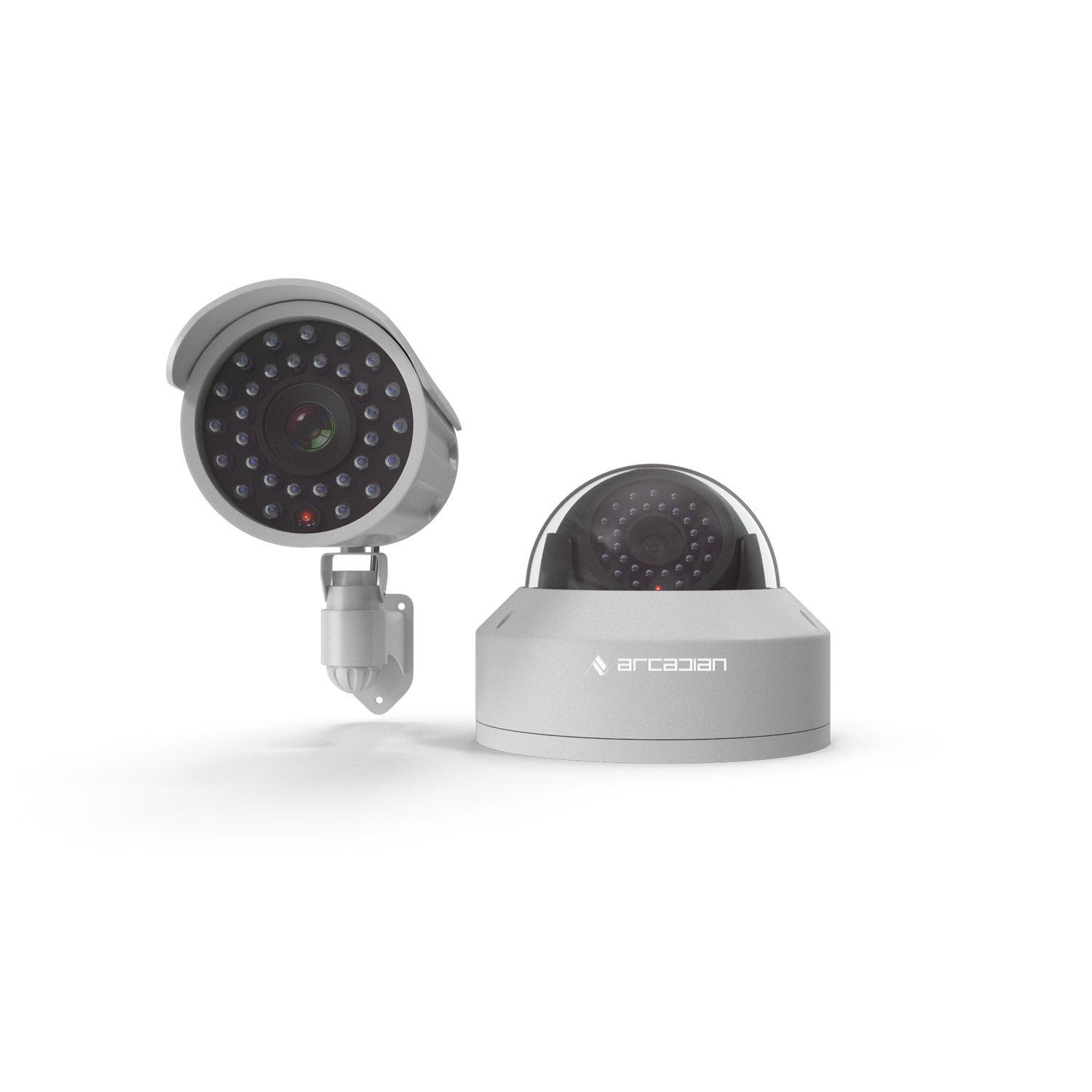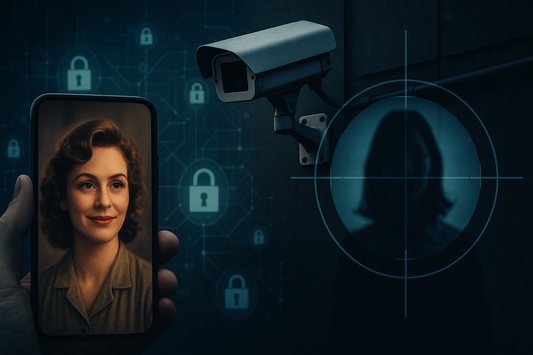UPS, FedEx, and DHL Security Challenges: Why Logistics Giants Need Smarter Surveillance in 2025
Cargo theft hit record levels in 2024 while porch piracy kept surging. Even with world-class networks, UPS, FedEx, and DHL are bleeding from in-transit, yard, and last-mile gaps. Here’s how AI surveillance (ArcadianAI + Ranger) closes them — with faster ROI than adding guards or cameras alone.

- Introduction (why this matters now)
- Quick Summary / Key Takeaways
- Background & Relevance
- Core Topic Exploration
- Comparisons & Use Cases
- DHL-Specific Scenarios (so we didn’t leave them out)
- Market Context: Why this is urgent in 2025
- How ArcadianAI deploys in brownfield logistics
- FAQ (real-world, search-driven)
- Conclusion & CTA
- External Sources (selected)
- Security Glossary (2025 Edition)
Introduction (why this matters now)
Cargo theft and parcel losses are no longer background noise — they’re an enterprise risk. 2024 set a new record for cargo theft in the U.S. and Canada, with 3,625 incidents, up 27% year over year, and an average loss of about $202,000 per event. (CargoNet) Meanwhile, package theft (porch piracy) continues to hammer shippers and consumers; survey data shows roughly one-quarter of American adults experienced theft, with per-package losses commonly around $200. (Security.org)
Scale amplifies the pain: UPS averaged ~22.4M packages/day in 2024, (SEC) FedEx moves comparable volumes across Ground, Express, and Freight, (Q4 Capital) and DHL operates in 220+ countries and territories with hundreds of thousands of employees. (DHL Group) Even USPS handled ~7.3B packages in 2024, while Amazon Logistics is now the #2 U.S. carrier by volume and on pace to surpass USPS by 2028 — changing who touches freight, where, and how often. (USPS Facts)
Traditional NVR/VMS stacks struggle to keep up. ArcadianAI — a cloud-native, camera-agnostic platform with our AI assistant Ranger — translates hours of video into structured evidence and proactive alerts, reducing noise, claims, and operating cost across hubs, sort centers, yards, and last-mile.
Quick Summary / Key Takeaways
-
Cargo theft reached record highs in 2024; losses are rising. (CargoNet)
-
Porch piracy remains pervasive and costly for shippers. (Security.org)
-
UPS, FedEx, and DHL run massive, complex networks; exposure compounds. (SEC)
-
80–90% of theft risk sits in-transit or in yards, not just inside buildings. (ttclub.com)
-
ArcadianAI + Ranger cuts false alarms, speeds investigations, and lowers claims.
Background & Relevance
-
Record cargo theft: 3,625 events in 2024 across U.S./Canada (+27% YoY); average loss ~$202k per incident. (CargoNet)
-
Porch piracy scale: ~25% of U.S. adults report package theft; 2024 estimates point to tens of millions of stolen parcels and multi-billion in losses. (Security.org)
-
Network exposure: UPS 22.4M/day; DHL in 220+ countries/territories; USPS 7.3B parcels in 2024; Amazon Logistics 6.3B and rising. (SEC)
Core Topic Exploration
Why cargo theft is exploding — and where losses occur
-
Modus operandi: Slide-door attacks, fictitious pickups, identity spoofing, pilferage at cross-docks, and trailer breaches in unsecured parking. ~85% of cargo theft occurs in-transit, including rest stops and yards. (ttclub.com)
-
Hot lanes & zones: Southern California “red zones,” interstate corridors, and holiday peaks. (See 2025 Q2 patterns.) (Overhaul)
-
High-value targets: Electronics, pharma, alcohol, cosmetics, small appliances — dense value, easy resale. (CargoNet)
What this means for UPS, FedEx, DHL
Their hub-and-spoke density, subcontracted linehaul, and high delivery velocity create attack surface at yards, drop lots, and last mile — places legacy camera stacks rarely monitor well and where security is fragmented.
Porch piracy: the last-mile failure everyone “owns”
-
Consumer theft prevalence: ~25% of adults report theft; seasonal spikes (Prime-Day/post-peak). (Security.org)
-
Shared liability: Retailers, carriers, and insurers shoulder different parts of the loss — investigations often stall without correlated video + telemetry.
Warehouse & cross-dock blind spots
-
Blind spots: Rear loading docks, dim yards, trailer doors, cage areas for high-value SKUs, returns processing zones.
-
Operational friction: Forklift pathways and conveyor choke points trigger false motion — legacy VMD floods guards with noise while real pilferage slips by.
Insider and contractor risk
-
Multi-party risk: Linehaul partners, temporary labor, 3PL subcontractors.
-
Behavioral indicators: Badge-tailgating, unusual dwell near cage areas, repeated “returns” handling, “accidental” camera occlusions — signals that traditional systems struggle to fuse.
What’s materially different about DHL
-
International dominance: DHL Express is the cross-border leader (220+ countries/territories); many theft exposures occur at international gateways, export facilities, and bonded areas with unique compliance and customs workflows. (DHL Group)
-
Regulatory shocks: Policy shifts (e.g., DHL’s temporary suspension of B2C shipments >$800 into the U.S. in April 2025 due to customs changes) force rapid process changes — and new security seams. (Reuters)
Why static NVR/VMS approaches fail in logistics
-
High motion environments (conveyors, yard traffic) overwhelm pixel-based motion; false alerts become habitual noise.
-
No context: Footage is unstructured. You can’t easily ask: “Show me every time trailer 7DL-932 was opened outside the dock between 22:00–05:00.”
-
Siloed evidence: Video, telematics, WMS, and access events aren’t fused, slowing claims and chargebacks.
How ArcadianAI + Ranger closes the gaps
-
Camera-agnostic AI: Works with existing UPS/FedEx/DHL cameras and NVRs; no forklift rip-and-replace.
-
Smart motion pre-filtering: Reduces noise frames by ~85–90% before deep AI, so operators see signals, not blur.
-
Object & action detection: Doors opened/closed, person on trailer roof, forklift entering caged lane, pallet transfer after hours, loitering near gate.
-
LLM-powered forensic search: “Find all instances of door-pop on bay 12 after midnight last week.”
-
Cross-data correlation: Link video + telematics + access control + WMS to build a timeline that insurers and law enforcement accept.
-
Privacy & compliance: Role-based access, encryption, audit trails, NDAA-aligned hardware pathways.
-
Bridge device: Secure on-prem link (no risky port-forwarding), enabling remote audits and rapid incident pulls.
Comparisons & Use Cases
A. Exposure matrix (typical pain points today)
| Area / Risk | UPS | FedEx | DHL | Why it matters |
|---|---|---|---|---|
| In-transit theft (trailers/linehaul) | High | High | High (intl focus) | 85%+ of theft happens in-transit; yards & rest stops are key. (ttclub.com) |
| Yard intrusions & tailgating | Medium | Medium | Medium | Fences/cameras miss human patterns (loiter, piggyback). |
| Hub/cross-dock pilferage | High | High | High | High-value cages & returns lanes = rich targets. |
| International gateway handoffs | Medium | Medium | High | Bonded areas, customs inspections, unique queues. (DHL Group) |
| Porch piracy claims pressure | High | High | Moderate (intl B2C) | Carrier-retailer-insurer triage needs correlated evidence. (Security.org) |
| False alarms (legacy VMD) | High | High | High | Conveyor/vehicle motion swamp pixel-diff logic. |
B. ROI — where AI surveillance pays for itself fast
| Cost Driver (Typical) | Legacy Approach | With ArcadianAI + Ranger | Net Effect |
|---|---|---|---|
| False-alarm dispatches | Frequent police/guard callouts; fines + fatigue | Smart pre-filtering + verified AI events | Fewer fines, less guard overtime |
| Cargo theft claims | Slow video pulls; weak evidence | Correlated video + telematics + access logs | Faster recoveries; better subrogation |
| Porch piracy disputes | He-said/she-said; scattered video | Clip generation with delivery & motion timeline | Quicker resolutions; happier shippers |
| Investigations | Hours scraping NVR; missed windows | Natural-language search over structured video | Minutes instead of hours |
| CapEx lock-in | Rip-and-replace refresh cycles | Use existing cameras; add AI overlay | Lower TCO, faster deployment |
DHL-Specific Scenarios (so we didn’t leave them out)
-
International Gateway Exception Handling
-
Problem: Irregularities during export screening or bonded storage (door tamper, cage linger, package hand swap).
-
Ranger: Detects door-pop, handoff without badge, pallet leave/return; auto-generates a timeline to support customs audit.
-
-
eCommerce Cross-Border Peaks
-
Problem: Peak season surges cause line queues and mis-sorts; more tempting for pilferage.
-
Ranger: Flags abandoned pallet, unexpected dwell, restricted-zone loiter and pushes to case management for QA and loss-prevention.
-
-
Policy & Compliance Shocks
-
Context: DHL’s temporary B2C >$800 to U.S. suspension in Apr 2025 required rapid process changes and created new seams. (Reuters)
-
Ranger: Gives ops leadership a single pane of glass to watch for policy-driven anomalies (new staging flows, longer dwell near compliance checkpoints).
-
Market Context: Why this is urgent in 2025
-
Carriers are reshuffling share and networks: USPS handled ~7.3B parcels in 2024; Amazon Logistics 6.3B and growing; alternatives grabbed 10% of U.S. volume in 2024. (USPS Facts)
-
Seasonal surges amplify risk (Prime Day/Cyber holidays) with theft spikes documented by multiple analyses. (Security.org)
-
Hot corridors (SoCal red zones, interstate hubs) keep evolving tactics — the trend isn’t reverting. (Overhaul)
How ArcadianAI deploys in brownfield logistics
-
Start in weeks: Connect to existing NVRs/cameras; no forklift upgrades.
-
Bridge: Encrypted on-prem link — no port-forwarding.
-
LLM-powered search: “Show every time a person entered trailer T-184 without a badge, 10pm–5am last week.”
-
Integrations: Access control, TMS/telematics, WMS; export structured timelines to insurers/LE.
-
Privacy & governance: RBAC, immutable audit logs, NDAA-aligned hardware options.
FAQ (real-world, search-driven)
How much do UPS, FedEx, and DHL lose to theft annually?
Precise carrier-level loss data isn’t public, but U.S./Canada cargo theft set a record 3,625 incidents in 2024 with ~$202k average per event, implying hundreds of millions in direct losses and more in disruption. (CargoNet)
Where does most cargo theft occur?
In-transit and yards (e.g., unsecured parking, rest stops) account for the vast majority of incidents; TT Club estimates ~85% occur in transit. (ttclub.com)
Can AI really reduce porch piracy costs?
Yes. AI can create verified delivery-to-theft timelines (courier arrival, handoff, subsequent removal) to speed refunds, subrogation, or police reports — especially when paired with access/telematics data. See seasonal spikes around major sales events. (Security.org)
Is DHL different from UPS/FedEx for security?
DHL’s heavy international footprint changes exposure (gateways, bonded areas, customs workflows) and policy shocks (e.g., temporary B2C >$800 into U.S. suspension in 2025). The core risks — in-transit and yard exposure — remain similar. (DHL Group)
How fast is ROI with ArcadianAI?
Typical drivers: fewer false dispatches, faster investigations, better claim outcomes, and lower CapEx by reusing cameras. Most sites see meaningful savings in the first months.
Conclusion & CTA
UPS, FedEx, and DHL run the arteries of global commerce — but the same scale that makes them essential makes them targets. 2024’s record thefts and 2025’s network shifts make one thing clear: static video is not security. AI-driven, evidence-grade surveillance is now a competitive advantage — for claims, for customers, and for cost.
External Sources (selected)
-
CargoNet — 2024 Supply Chain Risk Trends (record thefts, average loss). (CargoNet)
-
Security.org — Package Theft Annual Report 2024; U.S. gov brief summarizing theft scale. (Security.org)
-
UPS (SEC) — 2024 daily average packages; company profile. (SEC)
-
DHL Group — Facts & figures; 220+ countries/territories; Q1 2025 statement. (DHL Group)
-
Pitney Bowes / industry coverage — Amazon Logistics volumes/market share; USPS volumes. (Parcel & Postal Tech Int'l)
-
TT Club / Overhaul — In-transit share of theft; 2025 Q2 hot zones. (ttclub.com)
-
Reuters — DHL policy change context (B2C >$800 to U.S.). (Reuters)
Security Glossary (2025 Edition)
-
AI Alerts — Automated notifications from AI models detecting defined security events (e.g., door-pop, loitering).
-
Bonded Area — Secure customs-controlled zone where imported goods may be stored without immediate duties.
-
Cargo Theft — Theft or pilferage of goods in transit or storage (often at yards, rest stops, hubs).
-
Case Management — Workflow software to organize evidence, notes, and actions for an incident.
-
Door-Pop — Unauthorized opening of a trailer/container door detected by video or sensors.
-
Dwell Time — Duration an asset (pallet, trailer) remains in a location; unusual dwell can signal risk.
-
LLM-Powered Search — Natural-language search over structured video metadata (objects, actions, timestamps).
-
NDAA-Compliant Hardware — Equipment that meets U.S. National Defense Authorization Act restrictions on certain vendors/components.
-
NVR (Network Video Recorder) — On-prem device recording IP camera streams; often lacks advanced analytics.
-
ORC (Organized Retail Crime) — Coordinated theft groups targeting retail and logistics nodes.
-
Porch Piracy — Theft of delivered packages from homes or building lobbies/porches.
-
Ranger (ArcadianAI) — AI assistant that filters motion, detects objects/actions, and enables semantic video search.
-
Rest-Stop/Red Zone — High-risk corridor or area for in-transit theft (e.g., SoCal red zones).
-
Telematics — Vehicle/asset data (GPS, door sensors) used to correlate with video evidence.
-
TMS/WMS — Transportation and Warehouse Management Systems used to orchestrate freight flows.
-
Trailer Breach — Unauthorized opening or cutting into a trailer to access cargo.
-
VSaaS (Video Surveillance as a Service) — Cloud-delivered video management and analytics platform.
-
VMS (Video Management System) — Software to view/manage cameras; often on-prem and reactive without AI.
-
Yard Security — Controls (cameras, gates, patrols, analytics) protecting drop lots, staging, and trailer parking.

Security is like insurance—until you need it, you don’t think about it.
But when something goes wrong? Break-ins, theft, liability claims—suddenly, it’s all you think about.
ArcadianAI upgrades your security to the AI era—no new hardware, no sky-high costs, just smart protection that works.
→ Stop security incidents before they happen
→ Cut security costs without cutting corners
→ Run your business without the worry
Because the best security isn’t reactive—it’s proactive.







